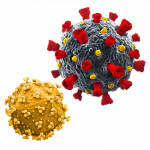HIV-positive individuals are at higher risk for various autoimmune diseases when compared with the general population, MedPage Today reports.
Publishing their findings in Annals of the Rheumatic Diseases, researchers analyzed data from the Taiwan National Health Insurance Research Database, identifying 20,444 individuals age 15 and older who were diagnosed with HIV between 2000 and 2012. They compared standardized incidence rates of autoimmune diseases among this group with rates among 2 million people from the general population.
The HIV-positive group had an average age of 30 and was 92 percent male. Sixty-seven percent of them were taking antiretrovirals (ARVs).
Compared with the general population, people living with HIV had a 1.64-fold greater risk of Sjögren’s syndrome, a 2.05-fold greater risk of psoriasis, a 2.59-fold greater risk of systemic lupus erythematosus (SLE), a 35.06-fold greater risk of hemolytic anemia, a 2.5-fold greater risk of uveitis and a 30 percent decreased risk of ankylosing spondyloarthritis.
Compared with the general population, the HIV-positive individuals on ARVs had a 1.95-fold greater risk of psoriasis, a 3.21-fold greater risk of uveitis, a 45.1-fold greater risk of hemolytic anemia, a 34 percent decreased risk of rheumatoid arthritis (RA) and a 36 percent decreased risk of ankylosing spondyloarthritis.
As for the HIV-positive individuals not taking ARVs, compared with the general population they were at a 1.52-fold greater risk of RA, a 1.95-fold greater risk of psoriasis, a 2.91-fold greater risk of Sjögren’s syndrome, a 4.17-fold greater risk of Hashimoto’s thyroiditis, a 5.15-fold greater risk of polymyositis, a 5.81-fold greater risk of SLE, a 7.89-fold greater risk of scleroderma and a 14.81-fold greater risk of autoimmune hemolytic anemia.
To read the MedPage Today article, click here.
To read the aidsmap article, click here.







Comments
Comments